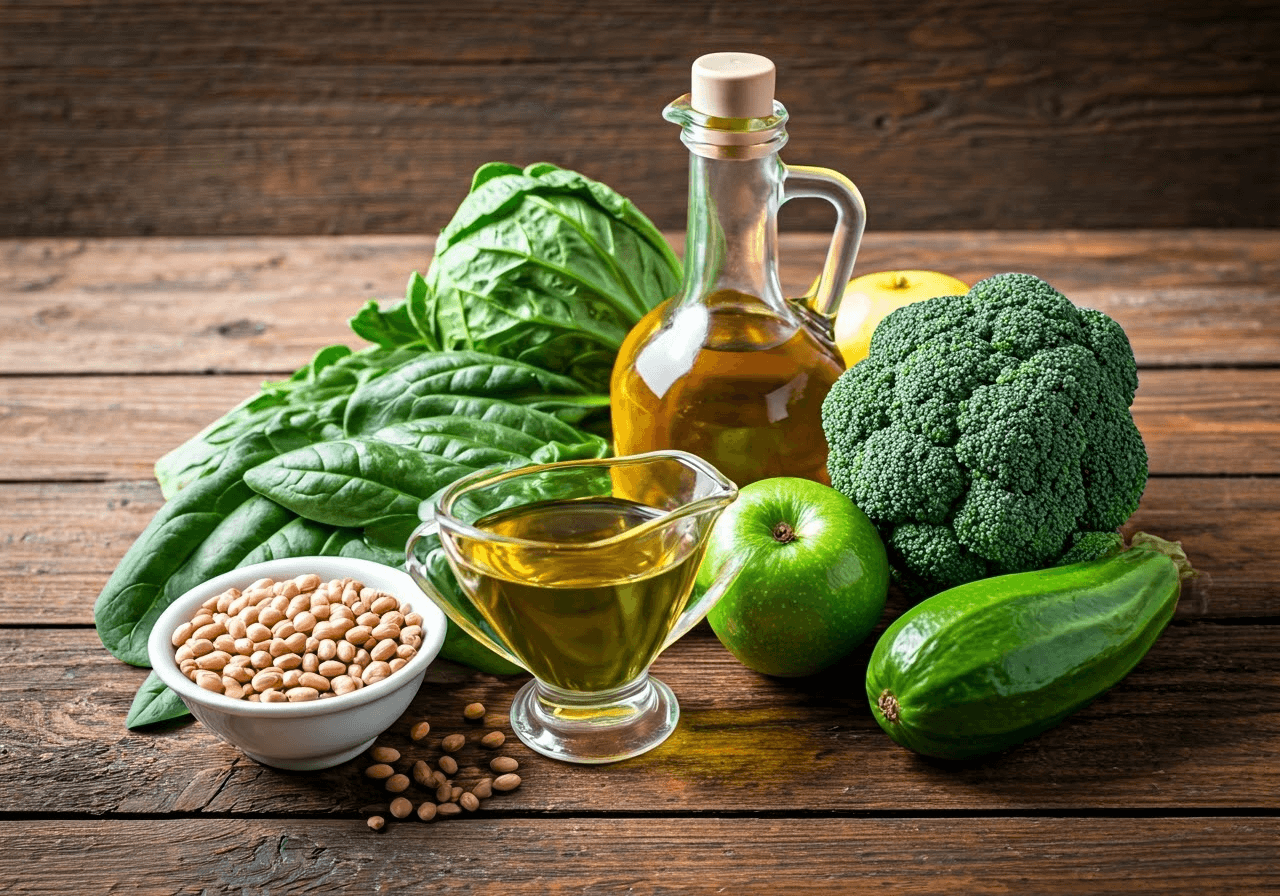
Introduction
Vitamin K is well-known for helping with blood clotting. It is an important nutrient for keeping good health. Vitamin K1, one type of vitamin K, is necessary for healthy bones and may also help the heart. This blog post will look at the benefits of vitamin K1, where to find it, how much you should take, and any possible interactions.
Understanding Vitamin K1 (Phylloquinone): Structure & Absorption
Vitamin K1, also called phylloquinone, is a fat-soluble vitamin that is important for many functions in our body, especially in the United States. You can mainly find this form of vitamin K in green leafy vegetables like spinach, kale, and collard greens.
The essential nutrient is not produced by the human body; therefore, it must be obtained through food or supplements. Vitamin K1 is readily absorbed in the small intestine and subsequently transported to the liver for storage and utilization. Maintaining sufficient levels of this vitamin is crucial for overall health.
Vitamin K1: Functions & Importance for Health
Vitamin K1 is mostly known for helping with blood clotting. It activates certain proteins that are needed to stop excessive bleeding when you get hurt. Besides its role in blood clotting, vitamin K1 helps bone health by supporting the creation of osteocalcin. This protein is important for making bones strong.
Recent studies also suggest that vitamin K1 might be good for heart health. But we still need more research to be sure about this. If you have questions about how much vitamin K1 you should have or how it affects your health, talk to your health care provider.
Vitamin K1 vs K2: Key Differences & Roles in the Body
Vitamin K1 is very important, but it helps to know about the different forms of vitamin K and what they do. Another key form is Vitamin K2, or menaquinone. Both Vitamin K1 and K2 are fat-soluble and are needed for blood clotting. However, they come from different sources and might affect vitamin K status in different ways.
You get Vitamin K1 mainly from plant-based foods. In contrast, Vitamin K2 comes from animal products, fermented foods, and is also made by gut bacteria. While K1 is mainly for blood clotting, studies suggest that K2 may be more important for bone health and the absorption of calcium.
More studies are needed to find out each form’s unique benefits. However, eating a balanced diet with both K1 and K2 can help improve the absorption of vitamin K and your overall health.
Top Health Benefits of Vitamin K1 for Blood, Bones & Heart
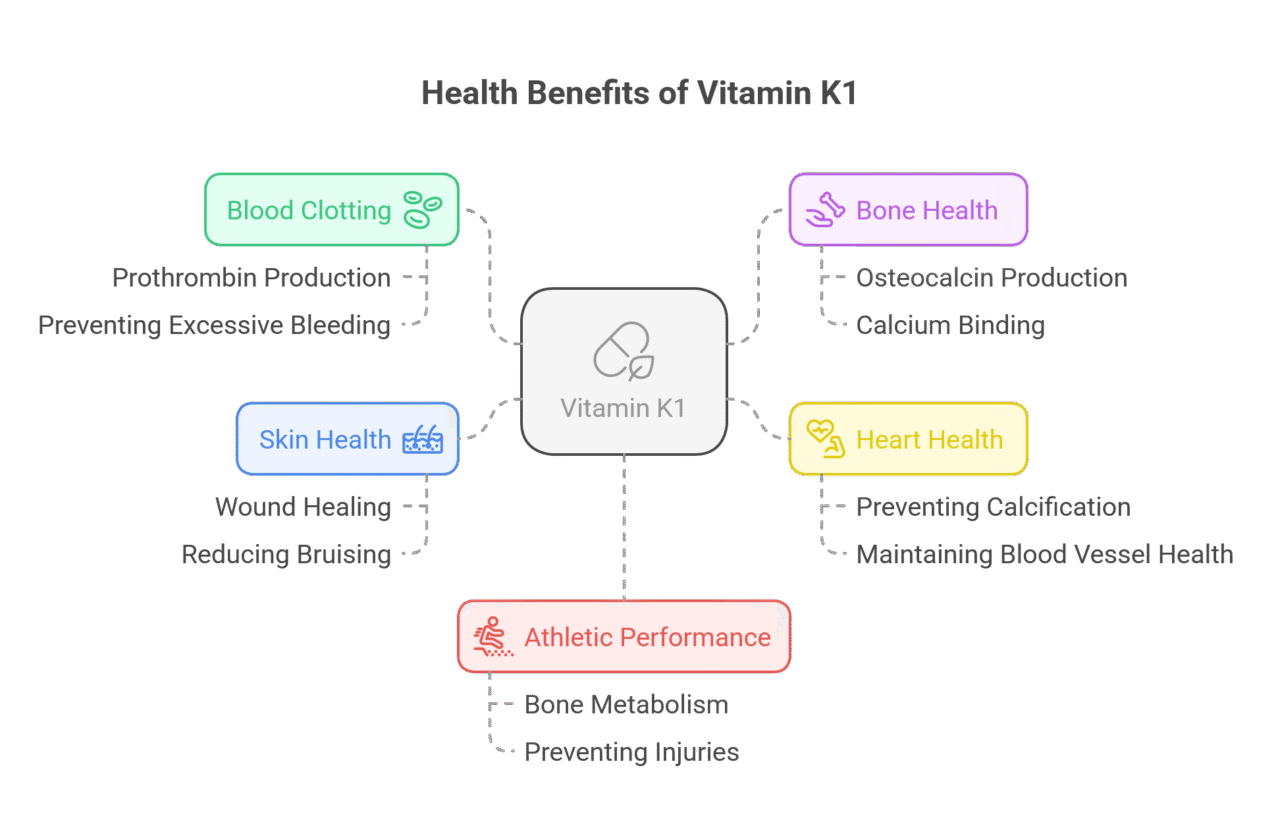
Vitamin K1 has many health benefits, and it is essential for our well-being. It helps with blood clotting and may also support bone and heart health. Vitamin K1 is important at every stage of life. Let’s look into these benefits more closely.
Vitamin K1 and Blood Clotting: How It Works
One main job of vitamin K1 is to help with blood clotting. It works as a helper in the cell biology of vitamin K, making prothrombin, a protein that is key for forming blood clots. This helps our blood to clot correctly when we get hurt, which stops us from bleeding too much.
If we do not have enough vitamin K1, the prothrombin time can take longer. This means our blood might not clot well, which raises the risk of bleeding. So, it’s important to have enough vitamin K1 in our diet. This helps make sure our blood can clot properly and protects us from losing too much blood.
Vitamin K1 for Bone Density & Bone Health
Vitamin K1 is important not just for blood clotting but also for bone health. It helps make a protein called osteocalcin. This protein helps calcium bind to bones, which improves bone mineral density and strength.
Research shows that getting enough vitamin K1 may lower the risk of bone fractures and bone loss, especially for older adults. Also, vitamin K1 might work well with vitamin D to support bone health. Vitamin D helps the body take in calcium, and vitamin K1 makes sure that calcium is used effectively in forming bones.
Vitamin K1 for Heart & Cardiovascular Health
New research shows that vitamin K1 may help heart health by providing a reduced risk of heart disease. Studies connect taking enough vitamin K1 with a lower chance of heart disease. The exact ways this works are not clear yet. Some scientists think vitamin K1 helps stop blood vessels from hardening.
The hardening, known as calcification, happens when calcium builds up in the arteries. This can limit blood flow and increase the risk of heart problems like coronary heart disease. By possibly stopping this hardening, vitamin K1, as noted by Shearer MJ in his research, might help keep blood vessels healthy. Still, more studies are needed to prove these ideas.
Vitamin K1 for Skin Health & Wound Healing
Some research suggests that vitamin K1 could help keep our skin healthy. The way vitamin K works in the skin is complicated, but it seems to help with healing wounds and may lower bruising.
Getting enough vitamin K1 is important for how well our blood clots. This is vital for fixing hurt blood vessels and helping wounds heal. Plus, vitamin K1 might make capillary walls stronger, which can make bruising happen less often.
Vitamin K1 and Athletic Performance: Role in Bone Strength
Vitamin K1 does not directly improve athletic performance. However, it plays a key role in bone metabolism. Athletes often put a lot of stress on their bodies with high-impact activities. This makes having strong bones very important.
Getting enough Vitamin K1 helps keep bones healthy. This lowers the chance of stress fractures and other bone injuries. By helping bones be strong and dense, Vitamin K1 allows athletes to avoid injuries and perform at their best.
Best Food Sources of Vitamin K1: Leafy Greens, Oils & More
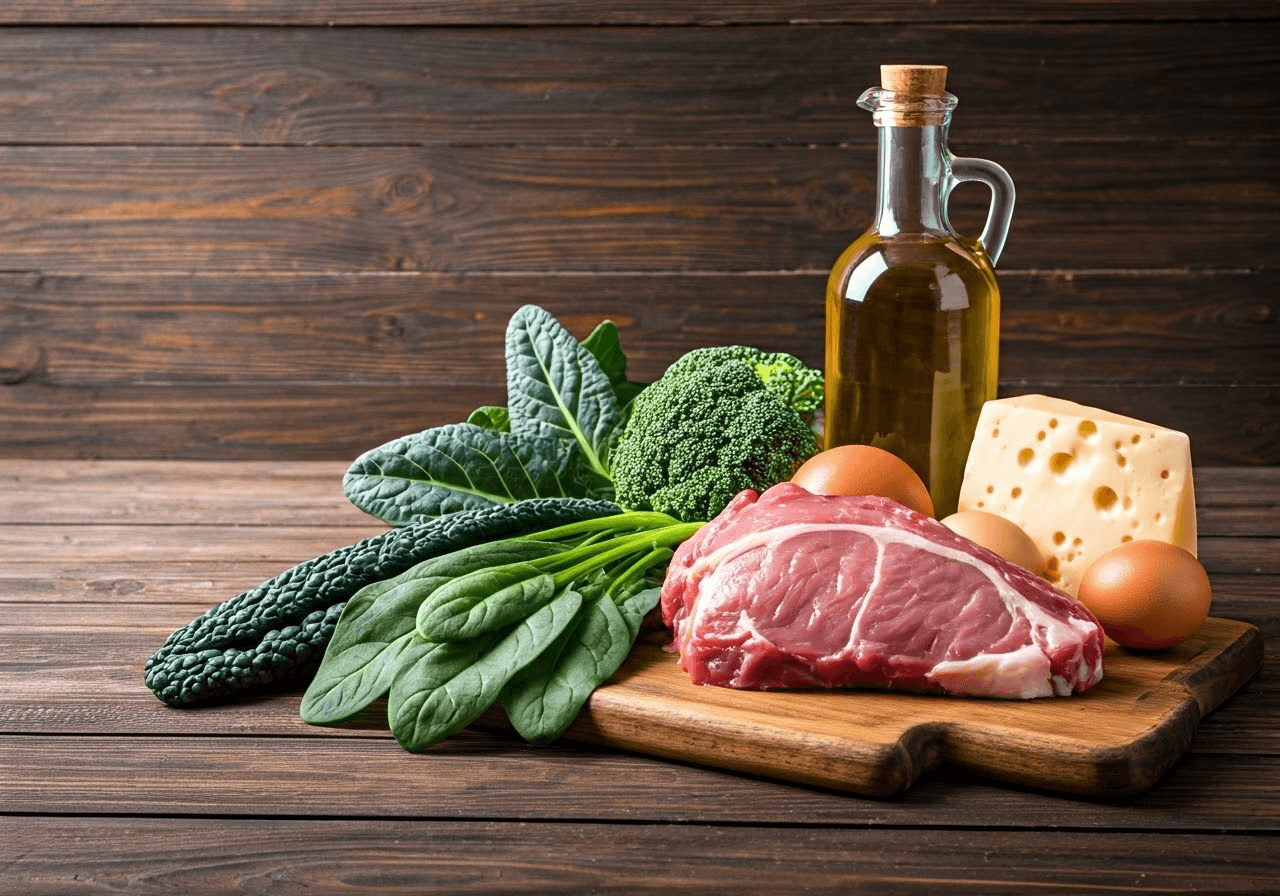
Vitamin K1 is found in many foods, so it’s simple to add it to our meals. Green leafy vegetables are especially great sources. Some fruits, plant oils, and animal products also have this important nutrient. Eating a mix of these foods can help you have an adequate intake of vitamin K1.
Green Leafy Vegetables High in Vitamin K1
Green leafy vegetables are the best sources of vitamin K1. They are full of nutrients and can easily be added to many meals. Here are some good examples:
Spinach: This leafy green is packed with vitamin K1. One cup of cooked spinach gives you more than your daily need.
Kale: This is another healthy choice and provides a lot of vitamin K1 per serving.
Collard greens: Like spinach and kale, collard greens are great for vitamin K1 and have other important vitamins and minerals.
Turnip greens: Don’t forget turnip greens! They are also a strong source of this vital vitamin.
Mustard greens: With a slightly spicy taste, mustard greens can make your meals interesting while helping to increase your vitamin K1 intake.
Make sure to look at the dietary supplement label for vitamin K1 when you pick supplements.
Below is a quick-reference table of top green leafy vegetables rich in vitamin K1, along with their key nutrients and simple tips for adding them to your meals.
| Food Source | Approx. Vitamin K1 Content (per 100g raw/cooked) | Other Notable Nutrients / Benefits | Tips for Consumption / Considerations |
|---|---|---|---|
| Parsley (raw) | ~1640 mcg | Vitamin C, iron, antioxidants | Use fresh as a garnish or in tabbouleh salads. |
| Swiss Chard (raw) | ~830 mcg | Magnesium, vitamin A, potassium, fiber | Use raw in salads or sautéed as a side dish. |
| Kale (raw) | ~817 mcg | Vitamin A, vitamin C, calcium, fiber | Great in salads or smoothies; lightly massage for tenderness. |
| Collard Greens (cooked) | ~530 mcg | Calcium, fiber, vitamin A, manganese | Traditionally cooked; can be sautéed or added to soups. |
| Turnip Greens (cooked) | ~530 mcg | Calcium, vitamin A, vitamin C, folate | Slightly bitter; best sautéed or braised. |
| Spinach (raw) | ~483 mcg | Iron, folate, magnesium, vitamin C | Eat raw or cooked; cooking increases bioavailability. |
| Broccoli (cooked) | ~140 mcg | Vitamin C, fiber, folate, potassium | Steam or roast for best nutrient retention. |
| Brussels Sprouts (cooked) | ~140 mcg | Fiber, vitamin C, folate, antioxidants | Roast or steam; naturally sweet flavor when caramelized. |
| Green Leaf Lettuce | ~126 mcg | Vitamin A, fiber, folate | Use in salads or as a wrap for sandwiches. |
| Romaine Lettuce (raw) | ~102 mcg | Vitamin A, folate, fiber | Crisp texture; ideal for salads and wraps. |
Plant Oils & Fruits Rich in Vitamin K1
Certain plant oils and fruits are not as rich in vitamin K1 as green leafy vegetables, but they can still help you get enough vitamin K. Soybean oil and canola oil have some vitamin K1 in them and are often used for cooking.
Fruits like blueberries, grapes, and prunes contain smaller amounts of vitamin K1 when compared to vegetables. Eating a mix of these foods along with leafy greens can help you get a good amount of vitamin K from different food sources. However, do not depend only on them to meet your daily needs.
Below is a quick-reference table of plant oils and fruits that provide small to moderate amounts of vitamin K1, along with their key nutrients and practical usage tips.
| Food Source | Approx. Vitamin K1 Content (per 100g raw/oil) | Other Notable Nutrients / Benefits | Tips for Consumption / Considerations |
|---|---|---|---|
| Natto (fermented soybeans) | ~930 mcg | Protein, probiotics, vitamin C, iron | Japanese dish; very high in vitamin K2 (menaquinone); strong flavor. |
| Soybean Oil | ~193 mcg | Vitamin E, polyunsaturated fats | Use in dressings or for sautéing; rich in K1. |
| Canola Oil | ~71 mcg | Omega-3s, vitamin E | Versatile for cooking and baking. |
| Olive Oil (extra virgin) | ~60 mcg | Monounsaturated fats, polyphenols | Use for salads and finishing dishes. |
| Prunes (dried plums) | ~60 mcg | Fiber, potassium, vitamin A | Snack or add to oatmeal; watch portion size. |
| Kiwi Fruit (raw) | ~40 mcg | Vitamin C, fiber, potassium | Eat fresh or add to smoothies; easy snack. |
| Avocado Oil | ~21 mcg | Monounsaturated fats, vitamin E | Good for high-heat cooking and dressings. |
| Blackberries (raw) | ~20 mcg | Vitamin C, fiber, antioxidants | Use fresh, in desserts, or with breakfast. |
| Blueberries (raw) | ~19 mcg | Vitamin C, antioxidants, fiber | Snack fresh or add to cereals/yogurt. |
| Pomegranate (raw) | ~16 mcg | Vitamin C, potassium, antioxidants | Eat seeds fresh or sprinkle on salads. |
| Grapes (raw, green) | ~14 mcg | Vitamin C, potassium, antioxidants | Enjoy fresh, in salads or as juice. |
Animal-Based Foods with Vitamin K1 Content
Plant-based foods are the main sources of vitamin K1, but some animal-based foods, including fast food, have small amounts too. This includes meat, dairy products, and eggs. Their level of vitamin K1 is usually lower than what you find in leafy greens. Still, adding them to a balanced diet can help increase your overall vitamin K intake.
For babies, breast milk has some vitamin K1, but it usually does not have enough to meet their needs. So, a single injection of vitamin K is often given to newborns soon after they are born. This is done to help prevent vitamin K deficiency bleeding.
Below is a quick-reference table of animal-based foods that contain small amounts of vitamin K1, along with their key nutrients and usage tips.
| Food Source | Approx. Vitamin K1 Content (per 100g cooked) | Other Notable Nutrients / Benefits | Tips for Consumption / Considerations |
|---|---|---|---|
| Liver (chicken) | ~8–13 mcg | Vitamin A, folate, B12, selenium | Popular in pâtés; eat in moderation due to high vitamin A. |
| Liver (beef) | ~6–12 mcg | Vitamin A, B12, iron, copper | Very nutrient-dense; consume in moderation due to vitamin A. |
| Butter (cow’s milk) | ~7 mcg | Vitamin A, saturated fat, D, calcium | Use sparingly; mainly as a spread or in cooking/baking. |
| Cheese (various) | ~2–3 mcg | Calcium, protein, vitamin A, B12 | Choose natural cheeses; modest source of vitamin K1. |
| Chicken meat | ~0.3–0.8 mcg | Protein, B vitamins, selenium | Grilled, roasted, or boiled; not a major source of vitamin K1. |
| Cow’s milk | ~0.3 mcg | Calcium, protein, B12, vitamin D | Drink as is or use in cooking; low in vitamin K1. |
| Egg yolk (chicken) | ~0.1–0.5 mcg | Protein, B12, choline, vitamin D, selenium | Best boiled or poached; main vitamin K1 in yolk, not white. |
Vitamin K1 Recommended Daily Intake & Dosage
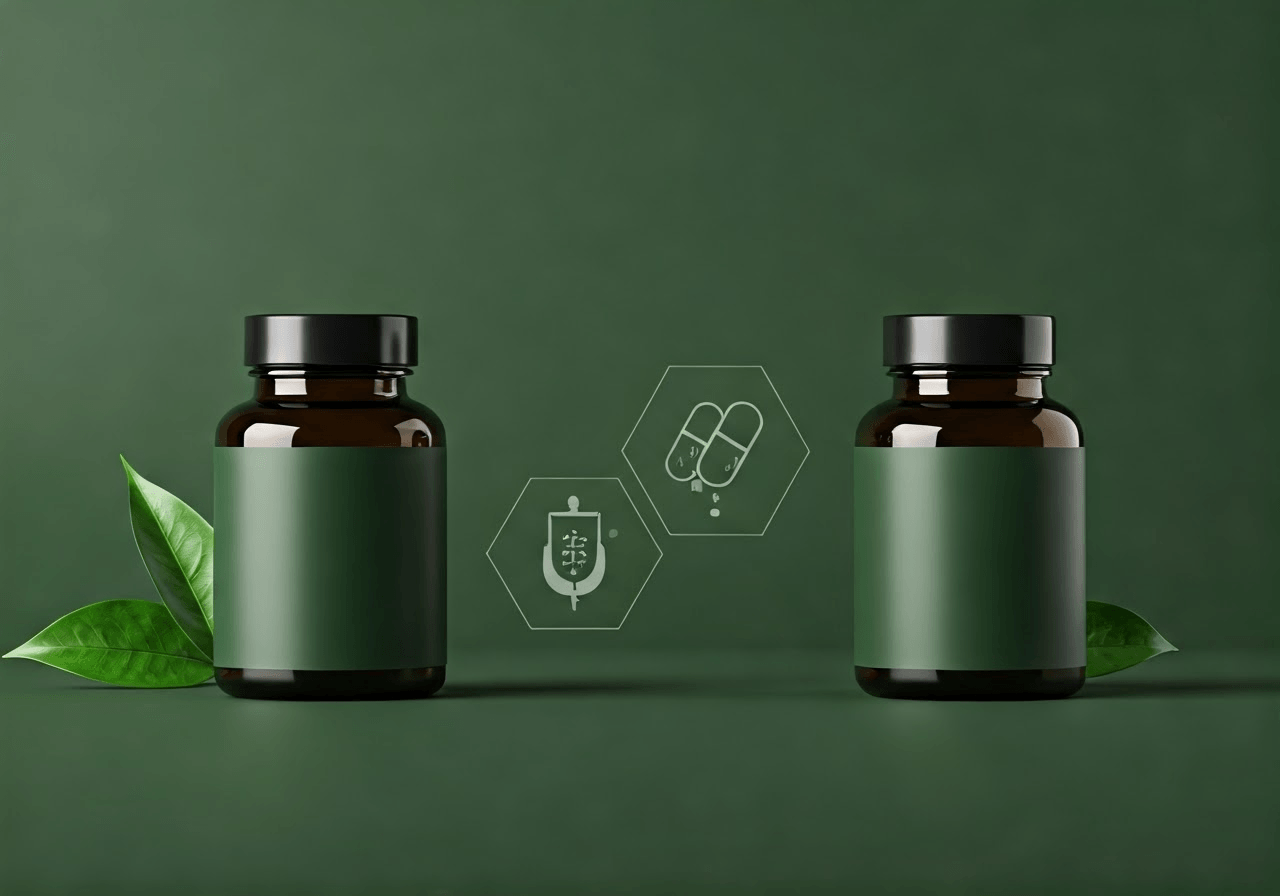
The daily amount of vitamin K1 you should take can change based on your age, gender, and health conditions, as well as the effects of vitamin K. Adults typically need about 90-120 mcg each day. To make sure you are getting the right amount for you, talk to your health care provider or a registered dietitian for advice that suits your needs.
Vitamin K1 Dosage Guidelines for All Ages
The National Institutes of Health provides guidelines for adequate intake (AI) of vitamin K, which encompasses both K1 and K2 forms. These recommendations vary depending on age and gender:
| Age Group | Recommended Daily Intake | Notes / Special Considerations |
|---|---|---|
| Infants 0–6 months | 2 mcg | Usually provided via breast milk or formula. |
| Infants 7–12 months | 2.5 mcg | Solid foods (e.g., pureed greens) may contribute to intake. |
| Children 1–3 years | 30 mcg | A balanced diet is generally sufficient. |
| Children 4–8 years | 55 mcg | |
| Children 9–13 years | 60 mcg | |
| Girls 14–18 years | 75 mcg | |
| Boys 14–18 years | 75 mcg | |
| Women 19+ years | 90 mcg | |
| Men 19+ years | 120 mcg | |
| Pregnant teens (14–18) | 75 mcg | No increase needed compared to non-pregnant teens. |
| Pregnant women (19+) | 90 mcg | No increase needed compared to non-pregnant adult women. |
| Breastfeeding teens (14–18) | 75 mcg | No increase needed compared to non-breastfeeding teens. |
| Breastfeeding women (19+) | 90 mcg | No increase needed compared to non-breastfeeding adult women. |
These guidelines ensure adequate intake for most individuals. However, pregnant or breastfeeding women might have slightly higher requirements. Consult your health care provider for personalized recommendations during these stages.
Adjusting Vitamin K1 Intake for Health Conditions & Medications
The National Institutes of Health gives general rules, but some health problems may require changes in your vitamin K1 intake. For example, people with malabsorption disorders may need bigger amounts to help with nutrient absorption.
Also, those taking blood thinners like warfarin should keep their vitamin K1 intake steady. It’s important to talk to your health care provider before changing your diet. Keeping track of your vitamin K intake is very important to avoid possible interactions with your medications. Always tell your doctor about any supplements you’re using to stop adverse effects.
Vitamin K1 Deficiency: Causes, Symptoms & How to Prevent It

Vitamin K1 deficiency is not very common, but it is important to understand what causes it, what signs to watch for, and how to prevent it. Some reasons for this deficiency include specific medical conditions, long-term use of antibiotics, or very limited diets.
Common Causes of Vitamin K1 Deficiency
Vitamin K1 deficiency happens when the body doesn’t have enough vitamin K1. This can be caused by different things. For instance, people with malabsorption disorders like cystic fibrosis or celiac disease may struggle to absorb fat-soluble vitamins, including vitamin K1. This can lead to a deficiency.
Using broad-spectrum antibiotics for a long time can upset the balance of gut bacteria. These bacteria naturally make vitamin K. When this balance is disturbed, there is less vitamin K produced, which can cause a deficiency. Newborns are at risk for vitamin K deficiency bleeding (VKDB) because they are born with small stores of vitamin K.
Symptoms of Vitamin K1 Deficiency: Warning Signs
It is important to know the signs of vitamin K1 deficiency for quick help. A main symptom is excessive bleeding or easy bruising, caused by problems with blood clotting. Other symptoms can include:
Nosebleeds
Blood in urine or stool
Heavy menstrual bleeding
Long bleeding from cuts or wounds
In serious cases, a lack of vitamin K1 can cause internal bleeding, especially in the brain, which is very dangerous. If you have any of these symptoms, get medical help right away.
These warning signs may indicate a vitamin K1 deficiency. The table below summarizes the most common symptoms, their descriptions, and recommended actions.
| Symptom | Description | Recommended Action |
|---|---|---|
| Easy Bruising | Unusually frequent or severe bruising from minor bumps or injuries | Increase dietary Vitamin K1 intake; consult your healthcare provider for blood clotting assessment |
| Excessive Bleeding | Prolonged bleeding from cuts, wounds, or surgical/injection sites | Seek medical attention promptly; have blood coagulation tests performed |
| Heavy Menstrual Bleeding | Unusually heavy or prolonged menstrual periods | Discuss with a healthcare provider; consider evaluation for Vitamin K and other clotting factor issues |
| Nosebleeds | Frequent or unexplained nosebleeds | Ensure adequate Vitamin K1 intake; consult your doctor if persistent |
| Blood in Urine or Stool | Presence of blood in urine or black/tarry stools | Seek immediate medical evaluation; may indicate internal bleeding |
| Internal Bleeding (Severe cases) | Spontaneous or unexplained internal bleeding (e.g. brain, GI tract) | Seek emergency medical help; urgent diagnostic testing required |
| Gum Bleeding | Bleeding gums during brushing or flossing | Improve oral hygiene; ensure sufficient Vitamin K1 in diet; consult a dentist or doctor |
Preventing Vitamin K1 Deficiency: Diet & Supplements
You can preventing vitamin K1 deficiency is important. You can do this by eating enough foods that have vitamin K1 or taking vitamin K supplements if needed. It’s essential to have a healthy diet that includes green leafy vegetables, some fruits, and plant oils.
If you have problems absorbing nutrients or if you take long-term antibiotics, your doctor might suggest a dietary supplement to help you avoid deficiency. Newborns get a vitamin K shot at birth to stop vitamin K deficiency bleeding. By following these steps, you can keep your vitamin K1 levels in check and support your overall health.
Who Needs Vitamin K1 Most: High-Risk Groups & Populations
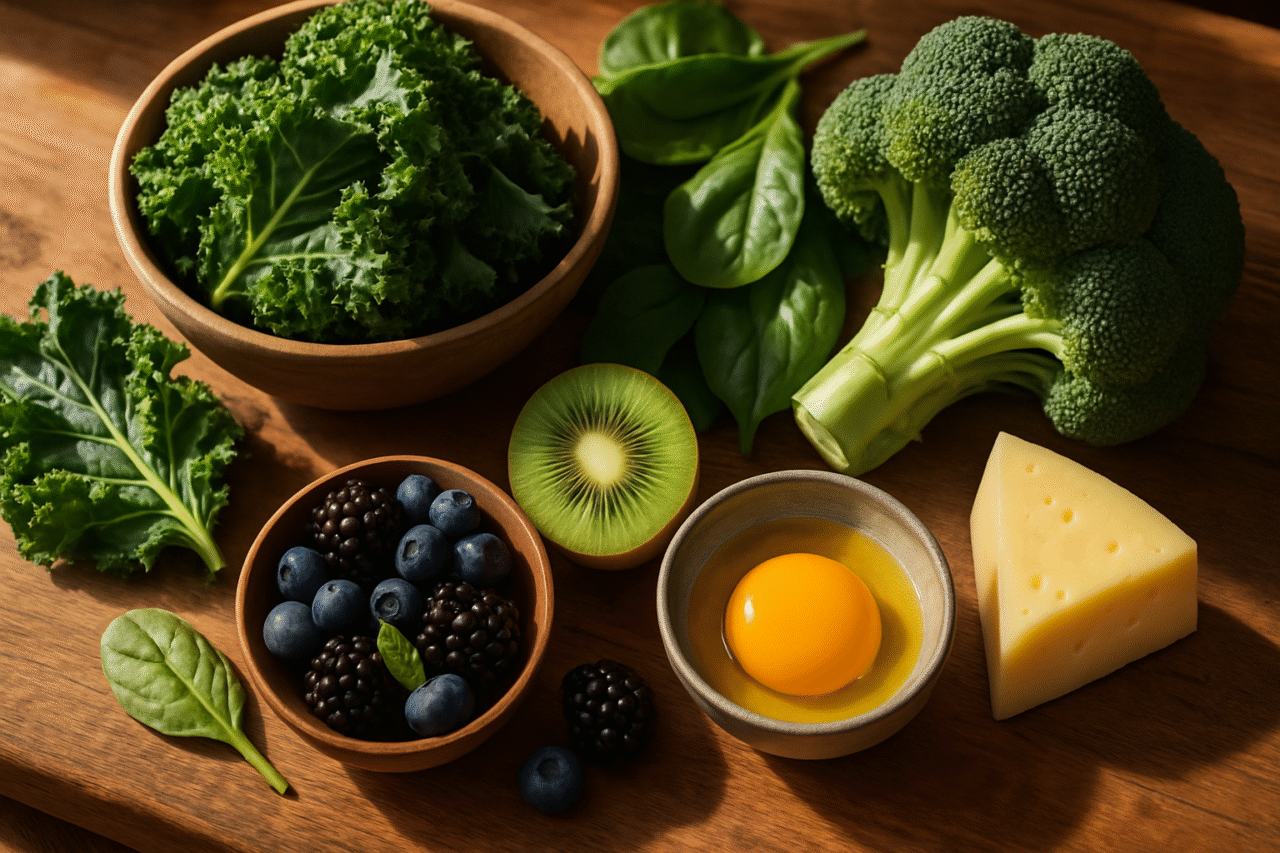
Vitamin K1 is important for everyone. However, some groups may need to focus a bit more on getting enough of it. These groups include people with certain health issues, those on specific medications, and individuals who are following special diets.
Vitamin K1 Needs for the General Population
For most people, eating a balanced diet with good sources of vitamin K1 is enough to meet daily needs. Adding foods like leafy green vegetables, broccoli, and Brussels sprouts to your meals can help you get enough.
Our bodies can store some vitamin K, but if we don’t eat enough of it, these stores can run low. This is why it is important to regularly include vitamin K1-rich foods in your diet to keep a steady supply of this necessary nutrient.
High-Risk Groups Prone to Vitamin K1 Deficiency
Some people are at high risk for not getting enough vitamin K1. They may need more food sources or, in some cases, a dietary supplement. The groups that are at risk include:
Newborns: Since newborns have low vitamin K levels at birth, they usually get a vitamin K shot.
People with malabsorption disorders: Issues like celiac or Crohn’s disease can make it hard for the body to absorb nutrients.
Individuals taking long-term antibiotics: Extended use of antibiotics can harm gut bacteria that produce vitamin K.
If you are in any of these groups, talk to your health care provider. They can help you decide if you need supplements or changes in your diet to avoid a deficiency.
Vitamin K1 for Athletes: Bone Strength & Recovery
It is important for everyone to get enough vitamin K1, but athletes might need to focus more on their vitamin K levels. Vitamin K1 is good for bone health, which is very important for athletes who put a lot of stress on their bodies.
Strong bones can help avoid stress fractures and other injuries. A healthy diet with enough vitamin K1 usually works for most people. However, if athletes have higher needs or worries about their bone health, they should talk to a sports dietitian or health care provider for personalized advice.
Individuals on Medications or with Health Conditions
People taking specific medicines, especially blood thinners like warfarin, need to watch how much vitamin K1 they consume. Vitamin K1 can affect how well these medicines work.
Also, those with liver disease or recovering from surgery may need to change their vitamin K1 intake. It is important to work closely with a health care provider to figure out what is best for each person. This can help avoid problems from too much or too little vitamin K1. Following medical advice about food choices or supplements is key to managing these health issues well.
Key Groups That Require Vitamin K1 the Most:
Group | Why They Need Vitamin K1 | Recommended Actions |
|---|---|---|
General Population | Supports normal blood clotting, bone health, and cardiovascular function. | Maintain a balanced diet rich in green leafy vegetables, plant oils, and fortified foods. |
High-Risk Groups | More prone to deficiency due to diet, medical conditions, or lifestyle. | Regular screening and ensuring sufficient intake through diet or supplements. |
Athletes | Supports bone strength, muscle recovery, and circulation. | Consume Vitamin K1-rich foods and healthy fats for optimal absorption. |
Elderly Individuals | Higher risk of osteoporosis and fractures; reduced absorption efficiency. | Ensure consistent intake from diet or consider supplementation under medical advice. |
Pregnant & Breastfeeding Women | Important for fetal development and preventing newborn bleeding disorders. | Follow recommended dietary intake and consult a doctor for potential supplementation. |
Newborns & Infants | At risk of Vitamin K deficiency bleeding (VKDB) due to low stores at birth. | Receive Vitamin K1 injection at birth, as per medical guidelines. |
Individuals with Fat-Malabsorption Conditions (e.g., Crohn’s disease, Celiac disease, Cystic Fibrosis) | Fat absorption issues lead to poor Vitamin K1 uptake. | May need higher intake through diet and supplementation as recommended by a doctor. |
People on Long-Term Antibiotics | Antibiotics disrupt gut bacteria that produce some Vitamin K. | Monitor Vitamin K1 levels and adjust diet or supplementation if necessary. |
Individuals on Orlistat or Cholestyramine (Fat-blocking medications) | These drugs reduce Vitamin K1 absorption. | Increase dietary Vitamin K1 intake and consult a healthcare provider. |
Who Should Limit or Avoid Vitamin K1?
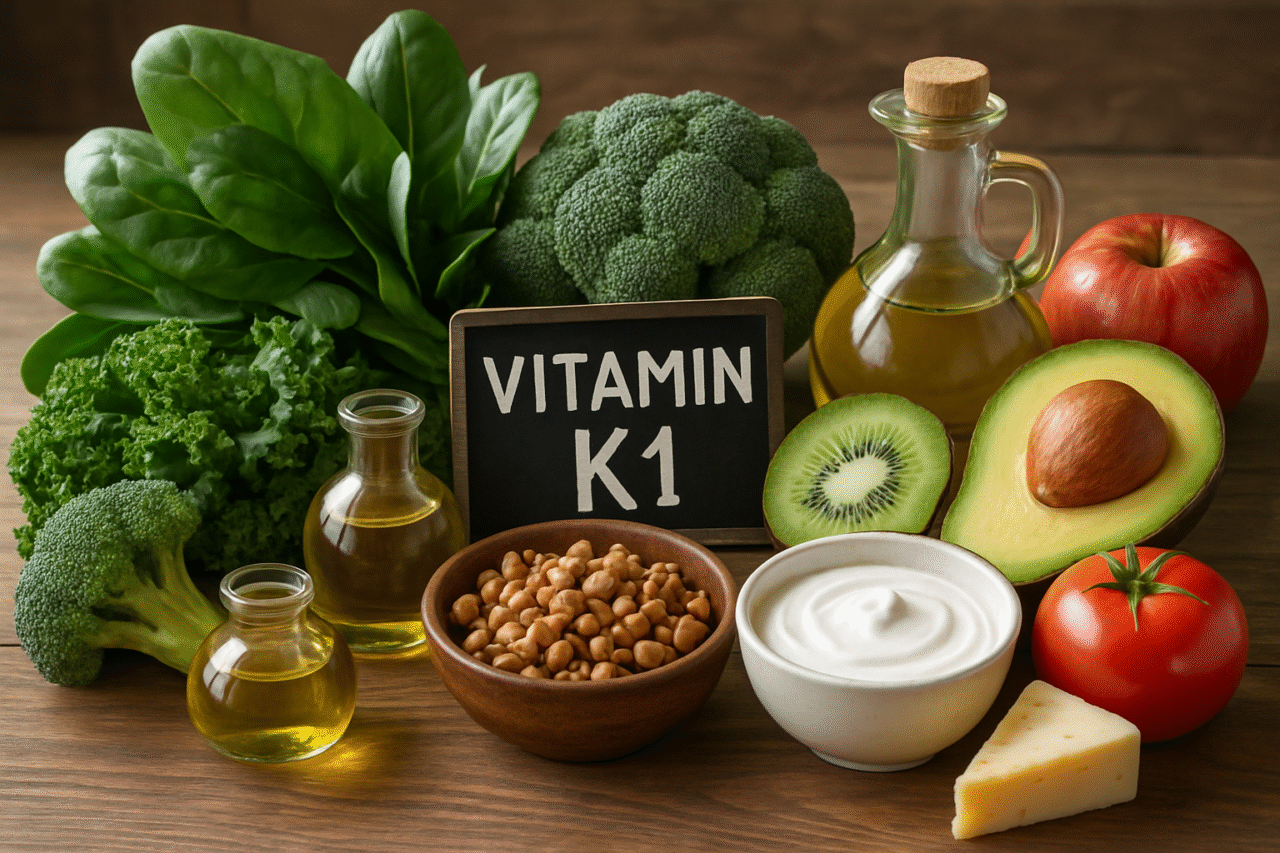
Vitamin K1 is usually safe to take. However, there are times when people should be careful or even avoid it. This is especially true for those who use blood thinners, have certain health conditions, or take medicines that interact with vitamin K1. They need to be particularly watchful.
Individuals on Blood Thinners (Anticoagulants) and Vitamin K1
Vitamin K1 is very important for blood clotting. That’s why people who take blood thinners (anticoagulants) need to pay attention to their vitamin K intake. Blood thinners work by affecting the clotting process, and vitamin K can lessen their effectiveness. So, it’s key for those on anticoagulants to keep their vitamin K intake steady through their food. They should also talk about any changes with their healthcare provider to avoid any bad effects. Watching vitamin K levels is necessary for people on blood thinners to keep proper clotting and stay healthy.
Vitamin K1 and G6PD Deficiency: What to Know
Glucose-6-phosphate dehydrogenase (G6PD) deficiency is a genetic issue that impacts red blood cells. People with G6PD deficiency can have problems like hemolytic anemia. This happens if they come into contact with certain substances, including high doses of vitamin K1.
Eating a moderate amount of vitamin K1 from food sources is usually safe for those with G6PD deficiency. However, it is important to avoid taking high-dose supplements. Always talk to your healthcare provider before using any supplements, especially if you have G6PD deficiency, to avoid any adverse effects.
Vitamin K1 Safety for Dialysis & Kidney Disease Patients
Patients receiving dialysis or those with serious kidney issues may have trouble getting rid of some substances, including minerals like potassium. Certain vitamin K1 supplements might add extra potassium, which could be dangerous for these people if not watched closely.
It’s very important for those with kidney problems to talk about their vitamin K1 intake with their doctors. They can check specific needs, suggest the right types of vitamin K1 (if necessary), and keep track of intake to avoid problems from imbalances in electrolytes.
Vitamin K1 Intake for Those with Blood Clot History
People who have had blood clots, like deep vein thrombosis (DVT) or pulmonary embolism, should be careful about taking vitamin K1. Vitamin K helps with blood coagulation, so too much of it might raise the risk of forming clots in those who are at risk.
Taking a moderate amount of vitamin K1 from food sources is usually safe. However, high-dose supplements should be skipped unless you talk to a healthcare professional first. It’s important to discuss your personal health risks and history with your doctor. This way, you can find a safe and smart way to use vitamin K1.
Groups That Should Limit or Be Cautious with Vitamin K1:
Group | Why They Need to Be Cautious | Recommended Actions |
|---|---|---|
Individuals on Blood Thinners (Anticoagulants) | Vitamin K1 affects blood clotting and can reduce the effectiveness of anticoagulant medications. | Maintain a consistent intake of Vitamin K1 from food, avoid sudden changes, and consult a doctor before making dietary adjustments. |
People with G6PD Deficiency | High doses of Vitamin K1 may trigger hemolytic anemia in individuals with this genetic condition. | Stick to moderate dietary intake and avoid high-dose supplements; consult a healthcare provider before supplementing. |
Patients on Dialysis or with Severe Kidney Disease | Some Vitamin K1 supplements may contain added potassium, which can be dangerous for kidney patients. | Consult a doctor to determine safe intake levels and avoid supplements that contain excess potassium. |
Anyone with a History of Blood Clots | High intake of Vitamin K1 may increase the risk of excessive blood clotting in individuals prone to clot-related conditions. | Consume Vitamin K1 in moderation, focus on food sources rather than supplements, and consult a doctor for personalized recommendations. |
Vitamin K1 and Medication Interactions: What to Watch For
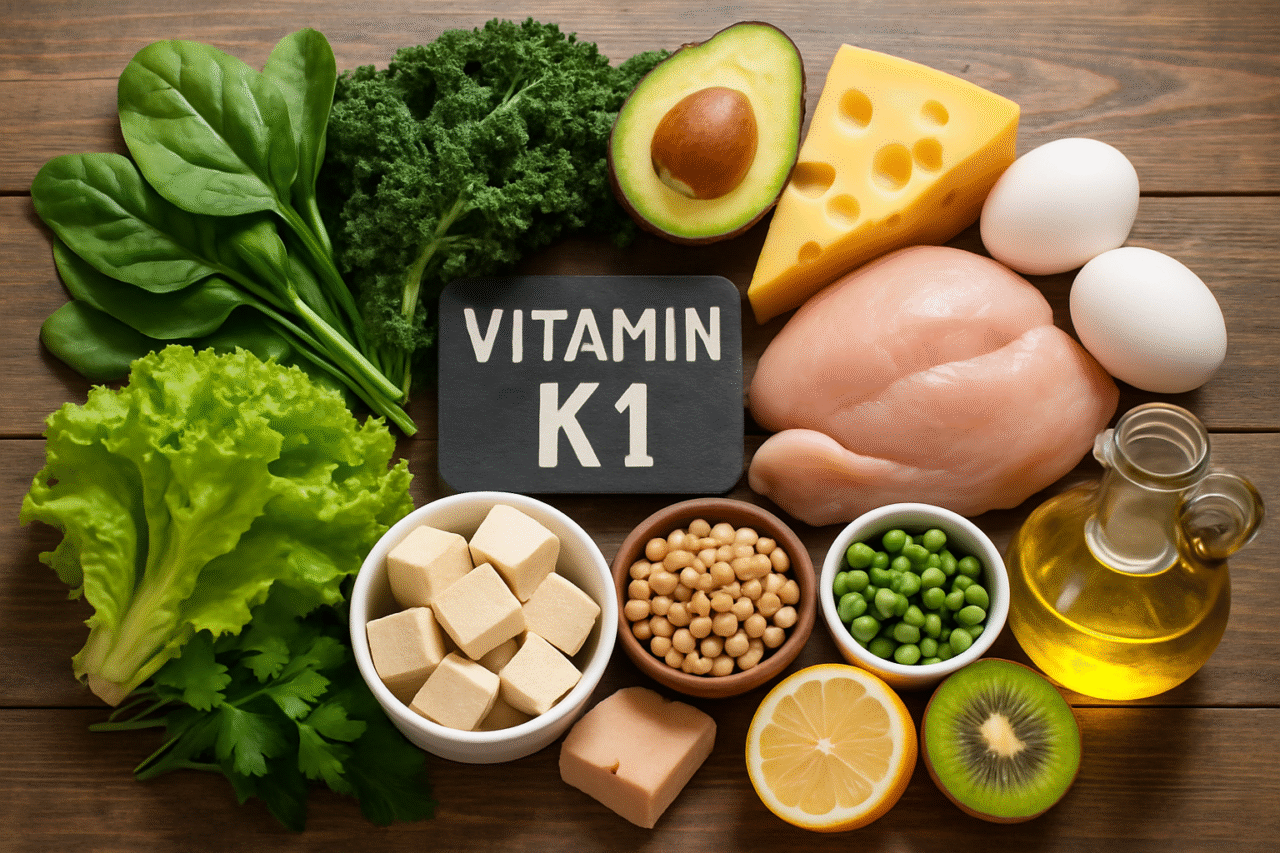
Vitamin K1 can affect some medications. This is why it is important to talk to your healthcare provider before starting new supplements or changing your diet a lot. Knowing about possible interactions can help avoid problems and make sure your treatment works well.
Vitamin K1 and Anticoagulants: Managing Your Intake
Anticoagulants, also called blood thinners, are drugs that help stop blood clots from forming. Warfarin (Coumadin) is a popular anticoagulant. It works by blocking the action of vitamin K1, which is important in the blood clotting process.
That’s why people taking anticoagulants need to have a steady amount of vitamin K1 in their diet. Changes in vitamin K1 levels can affect how well these drugs work. It’s a good idea to talk to your doctor or a register dietitian about what to eat and to keep track of your vitamin K1 intake while using anticoagulants.
Other Medications Affected by Vitamin K1
Vitamin K1 can interact with some other medicines, not just anticoagulants. For instance, certain antibiotics may lower how much vitamin K1 your body absorbs in the gut. This can lead to a deficiency.
Also, some weight-loss drugs and cholesterol-lowering medicines might affect vitamin K1 absorption. It’s important to talk about all the medications and supplements you use with your healthcare provider. This can help you find any possible interactions. Taking these steps can prevent adverse effects and make your treatment plan better.
The table below summarizes common medications that can affect Vitamin K1, how they interact, and what precautions to take.
| Interaction Type | Example(s) | Effect on Vitamin K1 or Health | Safety Tip |
|---|---|---|---|
| Antibiotics | Cephalosporins, Rifampin, Broad-spectrum antibiotics | May reduce Vitamin K1 synthesis by gut bacteria, increasing deficiency risk | Monitor for signs of deficiency, especially with long-term use; consult your doctor |
| Bile Acid Sequestrants | Cholestyramine, Colestipol | Reduce absorption of fat-soluble vitamins, including Vitamin K1 | Supplement Vitamin K1 if prescribed; inform your doctor |
| Orlistat & Weight-loss Drugs | Orlistat, Alli | Decrease fat absorption, lowering Vitamin K1 uptake | Take Vitamin K1-rich foods/supplements; discuss with a healthcare provider |
| Anticonvulsants | Phenytoin, Phenobarbital, Carbamazepine | May increase Vitamin K1 metabolism and lower blood levels | Monitor Vitamin K status during therapy; adjust intake as needed |
| Blood Thinners (Anticoagulants) | Warfarin, Coumadin | Vitamin K1 counteracts effects, affecting blood clotting balance | Maintain consistent dietary Vitamin K1; never change dose without medical advice |
| Cholesterol-lowering Meds (other than bile acid sequestrants) | Statins, Ezetimibe | Rarely interfere with Vitamin K1 absorption (not common) | Check Vitamin K status if taking long-term; consult your doctor |
| High-dose Vitamin E | Vitamin E supplements | High doses may antagonize Vitamin K1 activity, increasing bleeding risk (mainly at supplemental doses) | Avoid excessive Vitamin E; seek guidance before high-dose supplements |
| Mineral Oil Laxatives | Mineral oil, liquid paraffin | Reduce absorption of fat-soluble vitamins, including Vitamin K1 | Avoid long-term use unless prescribed; ensure adequate vitamin K1 intake |
How to Absorb Vitamin K1 Efficiently: Tips & Tricks
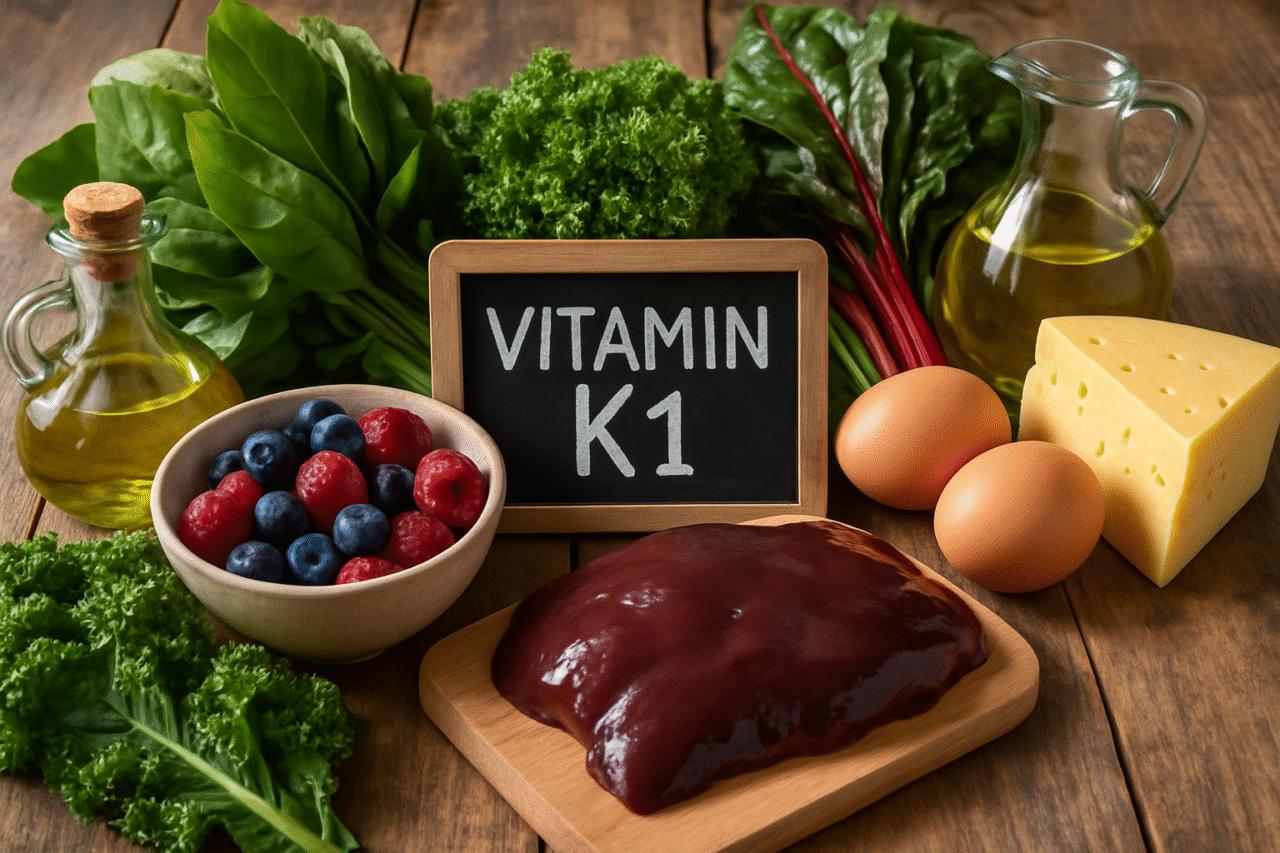
To get all the benefits of vitamin K1, it’s important to improve how well your body absorbs it. You can use some easy tips in your diet to help with this. This will make sure your body can use this fat-soluble vitamin in the best way possible.
Eat Vitamin K1 Foods with Healthy Fats
Vitamin K1 is a vitamin that dissolves in fat. This means you need fat to absorb it well. Eating foods high in vitamin K1 along with healthy fats can really improve how well your body uses it.
When you eat fat, your body creates bile. Bile is important because it helps break down fats and vitamins that also dissolve in fat in your small intestines. This process makes it easier for vitamin K1 to enter your blood. To help absorb it better, you can drizzle olive oil on your kale salad, add avocado to your spinach smoothie, or enjoy some nuts and seeds in your meals.
Cooking Greens for Better Vitamin K1 Absorption
Leafy green vegetables that are high in vitamin K1 should be cooked lightly or blended. This helps keep their nutrients safe. Cooking methods like steaming or sautéing work well to keep vitamin K levels high. This vitamin is important for bone health and blood clotting. If you avoid overcooking, you prevent losing these vitamins. This way, you get the most benefits from your greens, which supports your overall health. Remember, the way you prepare your greens can really change their nutritional value.
Consistent vs. Occasional Vitamin K1 Intake: What Matters
When you think about vitamin K1, having a balanced diet is very important. This helps you keep enough vitamin K1 in your body. Unlike some vitamins that leave your body easily, vitamin K1 is kept in the liver and fat for later use.
But, the amount stored is not very high. It can run low if you do not eat enough. Instead of depending on big doses from supplements now and then, try to get vitamin K1 regularly from food sources. This way, your body will have a steady supply of this vital nutrient to stay healthy.
Taking Vitamin K1 Supplements with Meals: Why It’s Important
If you are taking oral vitamin K supplements, it is usually best to take them with food, especially meals that have some fat. Vitamin K1 is fat-soluble, which means it needs fat to be absorbed well.
Eating your supplements together with a meal that has healthy fats helps your body absorb them better. This easy tip makes sure your body can use vitamin K1 effectively, so you get the most benefits. Always talk to your healthcare provider before starting any new supplements, including vitamin K1.
Easy Ways to Add Vitamin K1 Foods to Your Diet
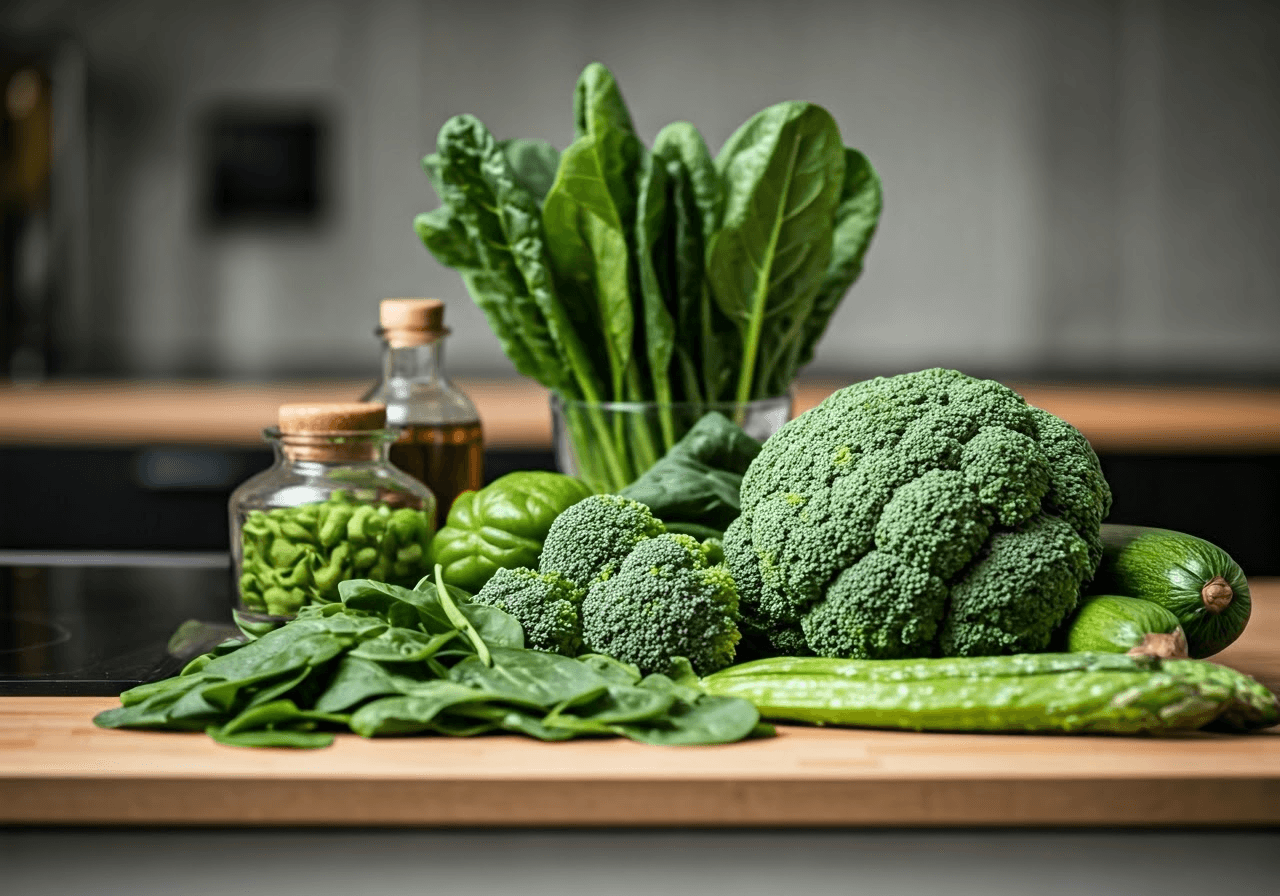
Eating a diet full of vitamin K1 is simpler than you may believe! This part offers ideas and helpful tips for adding more foods high in vitamin K1 to your everyday meals and snacks.
Everyday Foods High in Vitamin K1 Content
You will be amazed at how simple it is to raise your vitamin K1 levels with common foods. First, try replacing your regular salad greens with spinach or kale. You can add some chopped kale to your morning omelet or your smoothies.
Roasting Brussels sprouts with a little olive oil and sea salt makes a tasty and healthy side dish. You can also hide spinach in sauces, soups, and stews to boost nutrition and keep the flavor. By making these easy changes, you can quickly increase your vitamin K1 intake!
Meal Planning & Recipes with Vitamin K1-Rich Foods
Planning your meals ahead of time can really help you get enough vitamin K1. Set aside one or two meals each week to include foods rich in vitamin K1.
You can try a spinach and feta quiche for a tasty and healthy breakfast or brunch. Make a kale salad with roasted vegetables and lemon-tahini dressing for a light and fresh lunch. For dinner, enjoy pasta with pesto made from fresh basil and spinach, or stir-fries filled with your favorite leafy greens.
Vitamin K1 Supplements: Benefits, Risks & When to Use
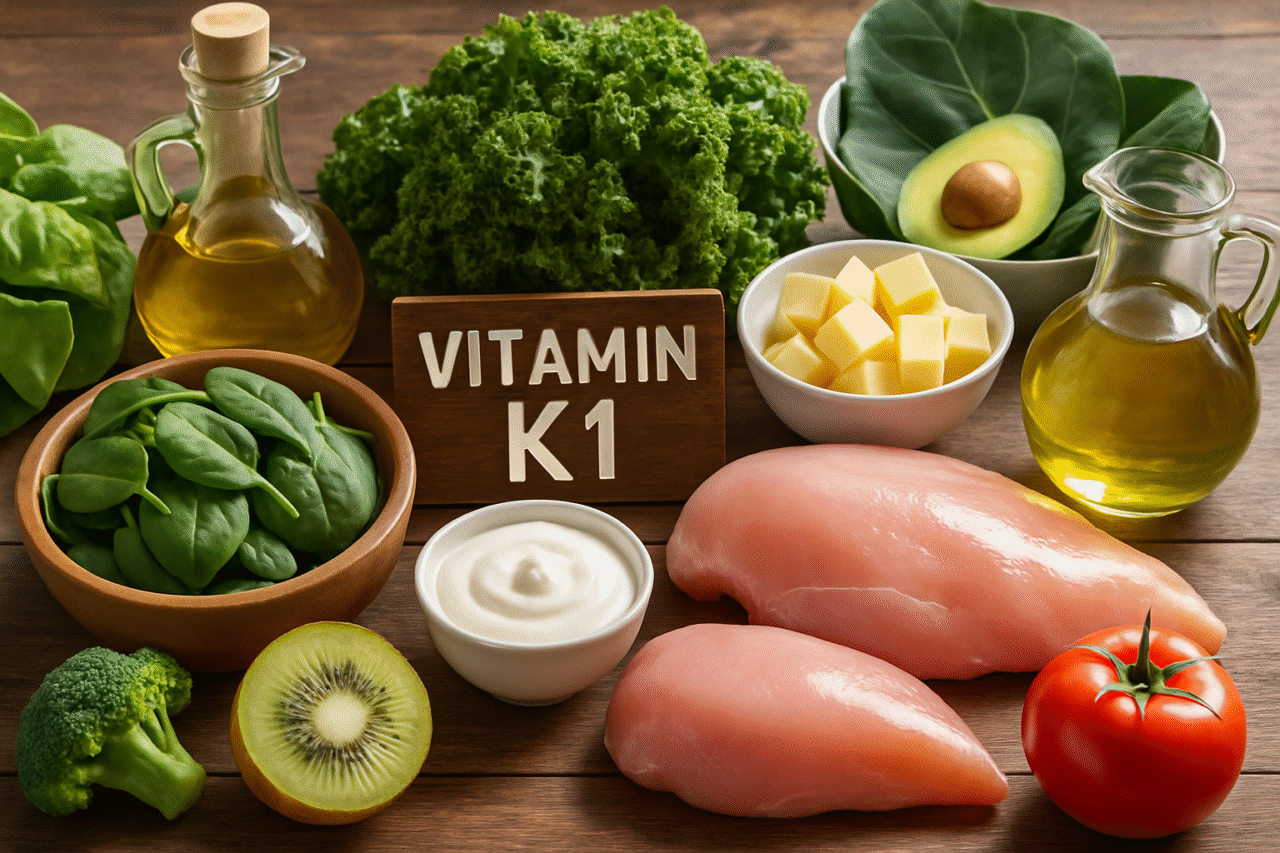
Getting nutrients from food sources is usually the best choice. However, there are times when taking vitamin K1 supplements may be needed. Knowing the pros and cons can help you make smart choices about using supplements.
When to Consider Vitamin K1 Supplementation
A good diet usually gives enough vitamin K1 for most people. However, there are times when taking a supplement might be needed. People who have trouble absorbing nutrients, those who take medications that affect vitamin K1 absorption, or those with confirmed low levels may need to take a supplement to get enough.
Newborns do not have much vitamin K1 at birth, so they get a shot of it shortly after they are born. It’s very important to talk to a doctor before starting any supplements, including vitamin K1. This way, you can find out the right dose and how long to take it based on your health needs.
Potential Risks & Choosing the Right Vitamin K1 Supplement
While vitamin K1 is generally safe, taking too much can be risky. This is especially true for people taking blood-thinning medicines or those with specific health issues. It is important to talk to your healthcare provider before starting new supplements. They can help you understand possible interactions and find the right dosage.
When you pick a vitamin K1 supplement, choose brands that are well-known and have clear labels. Make sure to check the dietary supplement label to see what form of vitamin K1 it has. Look for products without unnecessary fillers, additives, or allergens. By being careful and well-informed, you can lower the risks and enjoy the benefits of vitamin K1 supplements.
Aspect | Pros | Cons |
|---|---|---|
Effectiveness | Provides a reliable source of Vitamin K1, especially for those with deficiencies. | May not be necessary for individuals with a well-balanced diet. |
Blood Clotting Support | Helps maintain proper blood clotting function, especially for those with low Vitamin K levels. | Can interfere with blood-thinning medications (e.g., warfarin) if intake is not consistent. |
Bone & Heart Health | Supports bone strength and may reduce the risk of osteoporosis and heart disease. | Excessive intake may lead to imbalances in blood clotting for certain individuals. |
Absorption | Supplements ensure adequate intake for people with fat-malabsorption conditions. | Absorption is better when taken with fat-containing meals, which some may overlook. |
Convenience | Easy to take, especially for those with dietary restrictions. | Natural food sources also provide additional nutrients and antioxidants. |
Safety | Generally safe when taken within recommended doses. | High doses may pose risks for individuals with kidney disease or blood disorders. |
Conclusion
Vitamin K1 has many benefits. It helps with blood clotting and improves bone density and heart health. You can find it in green leafy vegetables and plant oils, making it important for your health. It’s also key to know how much you should take each day and how it might interact with medicines like blood thinners. While vitamin K1 is good for most people, some may need to be careful, especially if they are on certain medications or have health problems. To help your body absorb vitamin K1 better, eat foods rich in it with some fats and think about supplements if a doctor advises it. By adding vitamin K1 to your diet in a smart way, you can enjoy its great health benefits.
The content on WellwayHub.com is intended for general informational purposes only and should not be taken as medical advice. Please consult your doctor or a qualified health professional before making any changes to your health routine.
Some links on WellwayHub.com may be affiliate links. This means we may earn a small commission if you make a purchase through these links, at no extra cost to you. This helps support our mission to provide trusted wellness content.
Frequently Asked Questions
Vitamin K1 can be taken every day. However, it’s important to think about your own health, especially if you are using blood thinners. Cooking greens gently or blending them can help to free up the vitamin. This makes it easier for your body to absorb.
Taking too much vitamin K1 from food is very unlikely. Your body is good at controlling vitamin K levels. But, if you take a lot of vitamin K supplements, they might affect some medications or be risky for people with certain health issues. That’s why it’s important to talk to your health care provider.
Vitamin K1 is important for blood clotting. It can affect how blood thinners, like anticoagulants, work. If you are getting blood thinners, it’s a good idea to discuss how to manage your vitamin K1 intake with your healthcare provider. They can help you maintain a steady amount to prevent any problems.
Vitamin K1 is safe to take during pregnancy if you stick to the right amounts from food sources. If you are thinking about supplements, talk to your health care provider. They can help you decide the right dosage for your needs. This way, you get the best advice based on your medical history and personal situation.
Vegetarians and vegans can easily get enough vitamin K1 by eating a lot of leafy green vegetables. Spinach, kale, and collard greens are great sources of vitamin K1. Adding foods like broccoli, Brussels sprouts, and green beans can help with adequate intake too.